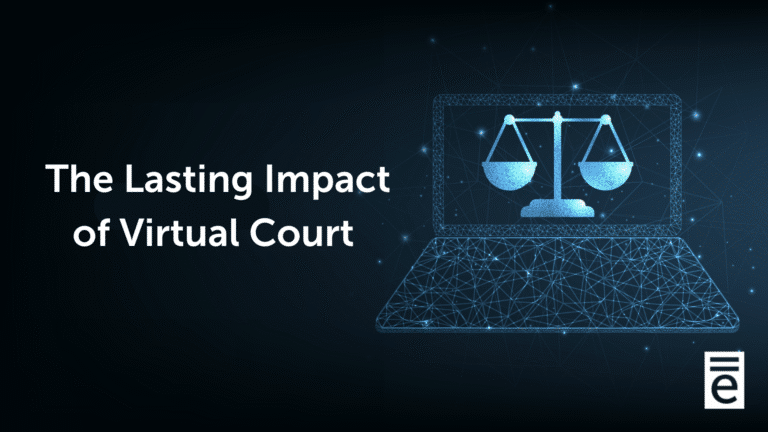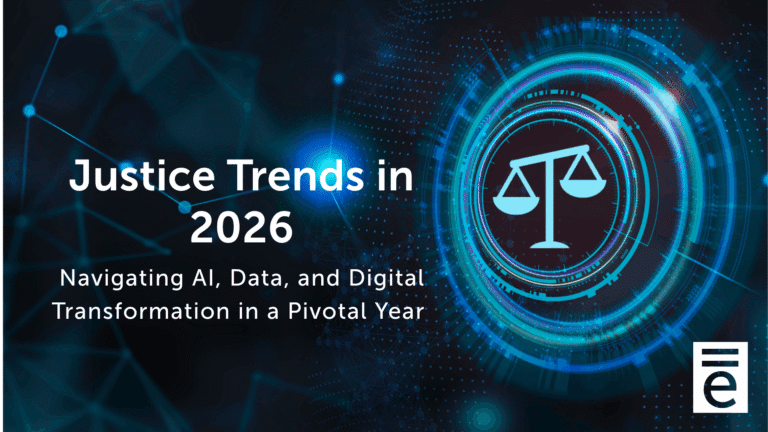It’s no secret that data plays an important role in the justice industry. If data is accurate and used effectively, it has the potential to tell a story and help inform strategic decisions. Without accuracy and transparency, though, data is essentially meaningless.
The push for data transparency has increased significantly over the last several years. One of the driving factors has been the efforts of the National Center for State Courts (NCSC) with the National Open Data Standards (NODS). NODS ensures vendors (like equivant) and courts communicate accurately so that the system is fair for everyone. It also allows easier access to reporting and statistics, higher quality data, and more efficient collaboration.
While the establishment of NODS has impacted the justice industry, there is still a lot of work to be done. This post explores the importance of quality data and how to support an organizational culture that understands and interprets data effectively.
Parts of this post have been adapted from the podcast Lessons in Data Quality with special guest Jane Wiseman, CEO of the Institute for Excellence in Government.
The Data Awakening
Over the last decade, huge volumes of data have been collected, but only a fraction has been analyzed. Advancements in technology have made collecting data the easy part. From smartwatches that track daily step counts and sleep to smartphones that track our activity across apps, the volume of data keeps growing. Because of this, there has been a push across many industries (the justice industry included) to leverage data to make strategic decisions and create policies.
While having access to lots of data sounds great, there is still substantial work to be done regarding data quality and interpretation. When it comes to government, there’s always a new crisis that court staff and government officials must prioritize. Because of that, getting to a place where data is clean and used as effectively as possible takes time. It’s a long-term project for the justice industry, but the goal is to get to a place where data is being used to make the world a better and safer place for all.
Improving Data Quality to Help Make the World a Better Place
If the goal is to use data to make the world a better place, the first step is to prioritize data quality. When you are talking about justice, even the slightest inaccuracies can mean the difference between somebody’s civil liberty and freedom. Data inaccuracy that changes the outcome of someone’s liberty is a significant societal problem. However, with efforts like NCSC’s NODS, we are starting to see change.
Adopting a new set of data standards can feel overwhelming and take time. Fortunately, there are still best practices that any court can implement to dramatically improve data quality while working to adopt NODS. Learning to define your data, practicing consistency, avoiding free text when tracking data, and conducting regular data audits are all steps to improve your data quality today. It’s a process; improved data quality won’t happen overnight.
Supporting an Organizational Culture that Understands Data
Working towards improved data quality and transparency is an important step, but supporting an organizational culture that understands data is essential to using it effectively. Data literacy for every worker is an important step. Many American workers have a gap in their ability to manage, think, and make good numbers-based decisions. That gap is directly connected to data quality. If someone doesn’t understand the value of numbers, they are less likely to prioritize accuracy during data entry.
Courts can support data literacy by offering training, mentoring, or coaching and creating communities of practice. Some organizations, like the U.S. General Services Administration, have done a great job of creating a culture of data by offering training that supports federal workers. There are also efforts happening at the city level. The city of San Francisco implemented the Data Academy, which offers training to Data Managers, Data Analysts, etc. The Data Academy has been copied in places like Kansas City, Denver, and San Diego, and other places are starting to move in a similar direction. While training like this takes time to implement, many free resources are available online to help train staff on data analytics methods that will help them use accurate, actionable data to improve decision-making.
Appointing a Project Champion to Improve Data Quality and Integrity
Like many initiatives, if you want to be successful in improving data quality, you need to put someone in charge (i.e., a Chief Data Officer, Chief of Analytics, etc.) and empower them. Define your vision for data use in your court. What types of data do you need to inform strategic decisions? What types of data inaccuracies do you need to solve to do that? Once you’ve answered the important questions, defined your vision, appointed a project champion, and provided them with resources, you can start taking on data projects that will move your court toward the future. Delaware County Juvenile Court in Ohio, an equivant client, has established effective identity management processes to get the most out of their CMS, increase efficiency, and reduce the number of duplicates in their system. Because of their efforts, data has become more accurate, and tracking the legal journey has become easier since case information isn’t spread across multiple identities. It’s a tedious process, but even small steps can make a big difference.
The perfect data-driven government won’t be accomplished overnight, even if all courts across the U.S. implement NODS and best practices tomorrow. But as long as we all keep trying, we can eventually get there.





